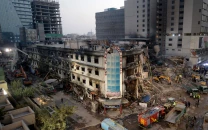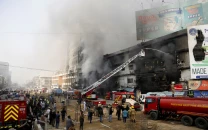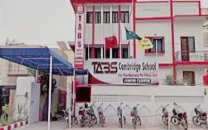No progress in sight: Political stratagems come back to haunt Sindh’s education sector
Khipro’s residents have high hopes from Shazia Marri but the rot seems to lie too deep.

With no boundary walls, students have to shoo away goats from their classrooms, which are sometimes used to store cotton. Social worker Abdul Ghaffar Leghari (bottom right) is running the area’s first private school. PHOTOS: EXPRESS
The party's past stratagems to maintain its political clout in rural Sindh now haunt those of its ministers who are still anxious to resuscitate the neglected public education system here.
A good case in point is Khipro, the country's largest administrative subdivision that spans 1,445,600 acres in Sanghar district. Meeting the Indian border in the East, the city still exhibits the cultural fusion of pre-Partition India, with a Hindu community that makes up only a little less than half of its population.

Since August 2013, Khipro's residents have harboured high hopes of change. It was then that PPP's Shazia Atta Marri scored a crucial victory in the by-election against the Hur Jamaat, which, under the leadership of Pir Pagara, had not lost here since the 1970s.
"When Marri paid a visit to the constituency the week after her victory, people from Sanghar and Matiari districts gathered at the National Highway in thousands to welcome her," recalls Advocate Abdul Ghaffar Leghari, a social worker who founded the first of Khipro's private Roshan Tara schools under the patronage of the Sindh Graduates Association in 1983.
In his early 70s, Leghari is a popular person in the city. Passers-by greet him when he is out on the streets; he modestly returns their salutations. "The residents of the city have been braving the harrowing educational situation regulated by the hordes of politically-appointed teachers for over two decades," he says wryly. "They hope Marri will address the state of affairs that starkly contrasts with what the Sindh education department says."
Marri steps up
There is nothing exceptionally wrong with Khipro if one goes by the provincial education department's official data. The Sindh Education Management Information System 2013-14 census states that the city has 710 public schools, with 1,111 teachers. Of these schools, 611 are functional with over 35,500 students enrolled.

Residents, however, say the data only covers up the rot. Listening to their woes, Marri on February 24, 2014, constituted a five-member education committee, comprising members of the community, with a mandate to submit their findings to improve public education in the city.
Along with Leghari, the committee included Muhammad Ibrahim Kumbhar, a former Karachi director of school education; Ramesh Kumar, a representative of the Hindu community; Shaukat Ali Qaimkhani, a representative of the Urdu-speaking community; and Muhammad Ali Bozdar, a media person.
Despite being offered financial assistance to carry out their mandate, the committee members refused to take even a single rupee, dividing their expenses among themselves. "We considered it a once-in-a-lifetime opportunity to help improve Khipro's public education system," says Kumbhar.
The reality emerges
"We visited over 150 schools prior to the summer vacations in 2014, and then submitted a comprehensive report highlighting the issues and giving recommendations for improvement to Marri," Bozdar, the committee secretary tells The Express Tribune. The committee continued its school surveys till September last year.
Years of negligence have left 90 per cent of the schools without usable washrooms or drinking water, while 80 per cent have no electricity. Around 60 per cent of Khipro's 625 primary schools are non-functional.

The average student attendance, meanwhile, was discovered to be less than a quarter of the number available with the provincial education department. Bozdar explains that fake enrolment —- or 'ghost students' — is a means to get more teaching posts at schools, leading to more political appointments. "For instance, a school with 150 students on its rolls could have five teachers appointed — one for every 30 students," he says. "In reality, the school would not have an attendance record of more than 35 students."
Of these appointed teachers, around 70 per cent do not show up in school. For Abdul Razzaq Sangrasi, Alif Ailaan's network coordinator for Sanghar district, the reason for teacher absenteeism is the unbridled political influence in the public education system since the late 1980s, when almost all vacant or newly-created teaching posts were filled for political reasons. Lawmaker Marri accepts the unfortunate fact that Sindh's teachers were used more for electioneering and political gains than teaching. "Phrases like 'teacher jis ka hoga, vote uss ka hoga' [he who has the teacher on his side has the vote] are the regrettable reality of our political consciousness," she tells The Express Tribune. "Without singling out any specific party, my political fraternity is to be blamed for this tragedy."
She believes it is unjustified to blame the PPP alone, at least in the case of Sanghar district, where Pakistan Muslim League-Functional held sway for so long, appointing hundreds of its supporters. The committee members have, however, informed Marri that the lower cadre of her own party as well as the overlords that supported her in winning the election place major obstacles in the way of betterment, says Leghari. "We reported the names of the teachers who have been drawing monthly salaries without showing up," he adds. "After facing a brief suspension, however, they ultimately get themselves reinstated by using political influence and bribing the education department's bureaucracy."
Published in The Express Tribune, March 18th, 2015.



















COMMENTS
Comments are moderated and generally will be posted if they are on-topic and not abusive.
For more information, please see our Comments FAQ